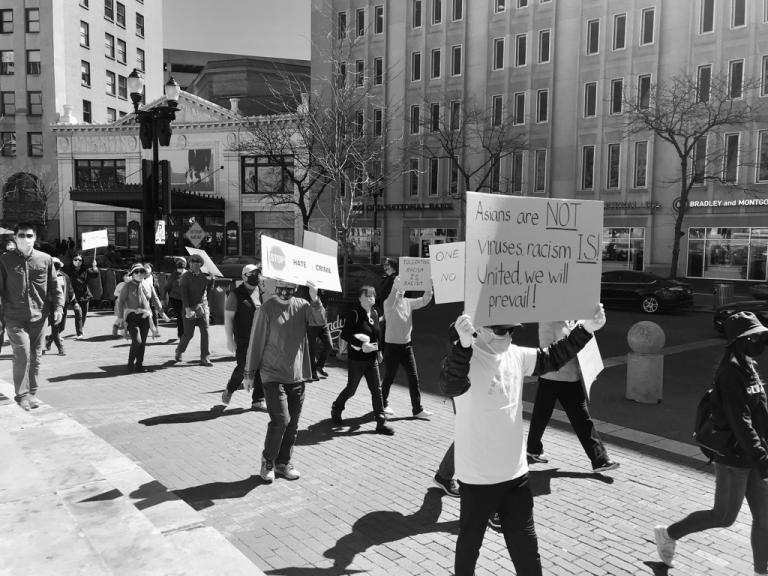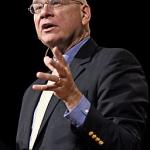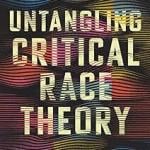
Last month a college student at Indiana University Bloomington was stabbed in the face by a woman who later confessed to police that she had attacked the student because the student is “Chinese.” The assailant explained that she wanted “one less person to blow up our country.” The brazen attack, which occurred on a public bus in the middle of the day, offered a stunning reminder to Asian Americans that they continue to be viewed as threatening foreigners and, as such, remain vulnerable to horrific acts of anti-Asian racism and violence, which has escalated in recent years due to the Covid-19 pandemic and tensions between the United States and China.
Last July, upon the release of Stop AAPI Hate’s recent report about anti-Asian attacks, I asked how Asian American Christians have drawn on their faith in the fight against racism. Asian American Christians, I argued, have long been involved in racial justice work and are at the forefront of efforts to address the needs of the current moment. But what about American Christians more broadly? How have they addressed the problem of anti-Asian racism?
To study this question, I studied the public statements about anti-Asian racism issued by Christian denominations in the United States during the first eighteen months of the pandemic. Using the list of the denomination websites compiled by the Hartford Institute for Religion Research as a starting point, my research collaborator, Kayla Zhang, and I searched the websites and social media feeds of 84 religious denominations and organizations, including 72 Christian denominations and organizations. We looked specifically for institutional statements or messages that explicitly discussed the issue of racism and violence against Asian Americans. We shared our findings in an article published in the January issue of Theology Today.
Overall, we counted 43 statements and public commentary from religious groups that explicitly condemned anti-Asian racism and violence and expressed their commitment to support and show solidarity with Asian Americans. Among these statements, 36 statements were from Christian organizations, some of which issued more than one statement. In total, 25 denominations issued statements: 7 evangelical denominations, 2 historically Black Protestant denominations, 12 mainline Protestant denominations, as well as the Catholic Church, the Church of Jesus Christ of Latter-day Saints, the Church of Christ, Scientist, and the Unitarian Universalist Association. The major Christian ecumenical organizations—the National Council of Churches and the National Association of Evangelicals—also issued statements.
Although support for Asian Americans came from across the theological spectrum, Christian denominations did not engage in this issue equally. Among the 15 most populous Protestant denominations in the United States, the majority (9) issued statements, and those denominations were mostly mainline Protestant. Of the six that did not, all but one were evangelical. In addition, all the mainline Protestant denominations that we searched had issued statements, whereas a minority of the evangelical denominations that we searched had done so. Overall, mainline Protestants appear to have been more likely than evangelicals to speak publicly about anti-Asian racism.
Despite their diverse origins, the statements issued by the Christian denominations had much in common. First, they generally appeared at the same time. The issue of anti-Asian racism drew national attention early in the pandemic, and a few denominations—the Evangelical Lutheran Church of America, for example—spoke publicly about anti-Asian racism as early as spring 2020. However, most denominations that issued statements did so a year later, after the mass shooting in Atlanta in April 2021, suggesting that an incident of mass violence can serve as a pivotal moment in compelling Christian denominations to speak out about the issue of racism. Only one denomination—the Church of God in Christ, a historically Black Protestant denomination—issued a statement that mentioned the mass shooting at the FedEx in Indianapolis, and they connected it to other instances of gun violence that had ended the lives of Black and Brown people.
In addition, the statements drew explicitly on many of the same themes. Christian unity was one important theme, as illustrated by the open letter by the Episcopal Bishops of African Descent:
Just as we affirm our conviction in One Lord, One Faith, and One Baptism, let us prove our identity as One Beloved Community, One human Family with One Heartbeat, and raise each other to our full humanity in Christ! Out of many, we are one. We rise and fall together. Let us, therefore, suffer together and raise each other!
Many other statements emphasized the theme of love, especially love that honors diversity. Take, for example, the statement from the Seventh-day Adventist Church in North America:
“God calls us to love all His children, no matter our differences. Our diversity makes us stronger as a people, and the variety of cultures making up our territory are a direct reflection of His creative power. We need to celebrate our differences and embrace the uniqueness of each and every person. We want all Asian-Americans to know we stand with them and beside them during this season where they are being unfairly targeted.”
Where the denominational statements on anti-Asian racism diverged was in how they understood the problem of racism. Most denominations explicitly identified racism as a problem in the United States, and many described racism as a sin. However, they differed in their understanding of who enacted this sin. Some denominations framed racism as an individual sin. In contrast, other denominations—in particular, historically Black Protestant denominations and Black organizations within mainline Protestant denominations—discussed racism as an evil enacted by society and the nation as whole. The Episcopal Bishops of African Descent, for example, described racism as “a particularly insidious disease and sin that has corrupted our knowledge systems, our national identity, our institutions, and our very soul as a human community,” and the Progressive National Baptist Convention pleaded “that Americans stand against the original sin of America—White Supremacy!” Some groups, like the Friends General Conference, called attention to how racism intersects with other forms of oppression. They noted that the attack on the Asian American women in Atlanta was “both racist and sexist” and “also targeted low-wage workers, who are frequently treated as disposable in our society.”
If Christian denominations differed in how their interpretation of the problem of racism, there were also differences in what they proposed as solutions. Most statements framed racism as a problem that religious people could address through private, individual actions: loving acts of prayer, gestures of care for Asian American neighbors, gentle conversations with community members, and improved education about Asian American experiences. Denominations across the theological spectrum recommended these types of responses. The National Association of Evangelicals, for example, stated that it “encourages our communities of faith to seek understanding of the historical and contemporary facets of racism in our country, to enter into hard conversations, and to humbly listen to the hurt and pain of others.” The National Council of Churches urged Christians to “dedicate ourselves to changing the hearts, minds, and behaviors of people in our churches and society to bring healing and wholeness to all.”
But what about public, collective action? If, as many denominations argued, racism is America’s “original sin” and a systemic problem embedded in institutions, what public policy solutions did Christian denominations support, if any? Some denominations did indeed offer calls for government action, but what they recommended varied and reflected how their own concerns connected to the issue of anti-Asian racism. Several denominations, like the Disciples of Christ and the New Federation of Asian American United Methodists, urged Americans, including elected officials, to use responsible language about Covid-19 and avoid stigmatizing rhetoric that harms Asian and Asian American people. The Friends General Conference focused on working with government to improve public awareness of resources to promote community safety. And the Church of God in Christ emphasized gun violence and called for government officials to “swiftly implement immediate and impactful efforts to help cease the senseless killings of Americans at the hand of law enforcement and mass shooters.”
Ultimately, despite frequent appeals to the virtue of unity, there was no unified American Christian response to the issue of anti-Asian racism. This fact is evident in the very different statements that denominations issued on the issue, with some Christian groups prescribing individual action and others calling for government action and policy change. And, more significantly, there is the fact that many denominations did not say anything at all. While two dozen Christian denominations chose to issue a public statement about anti-Asian racism, the majority of the denominations we searched were silent on the matter.
Altogether, the different statements (or lack thereof) illuminate the substantial differences among American Christians about how to understand and respond to racism and other social problems. These differences relate, in turn, to the long-standing demographic, theological, and political diversity within American Christianity.













